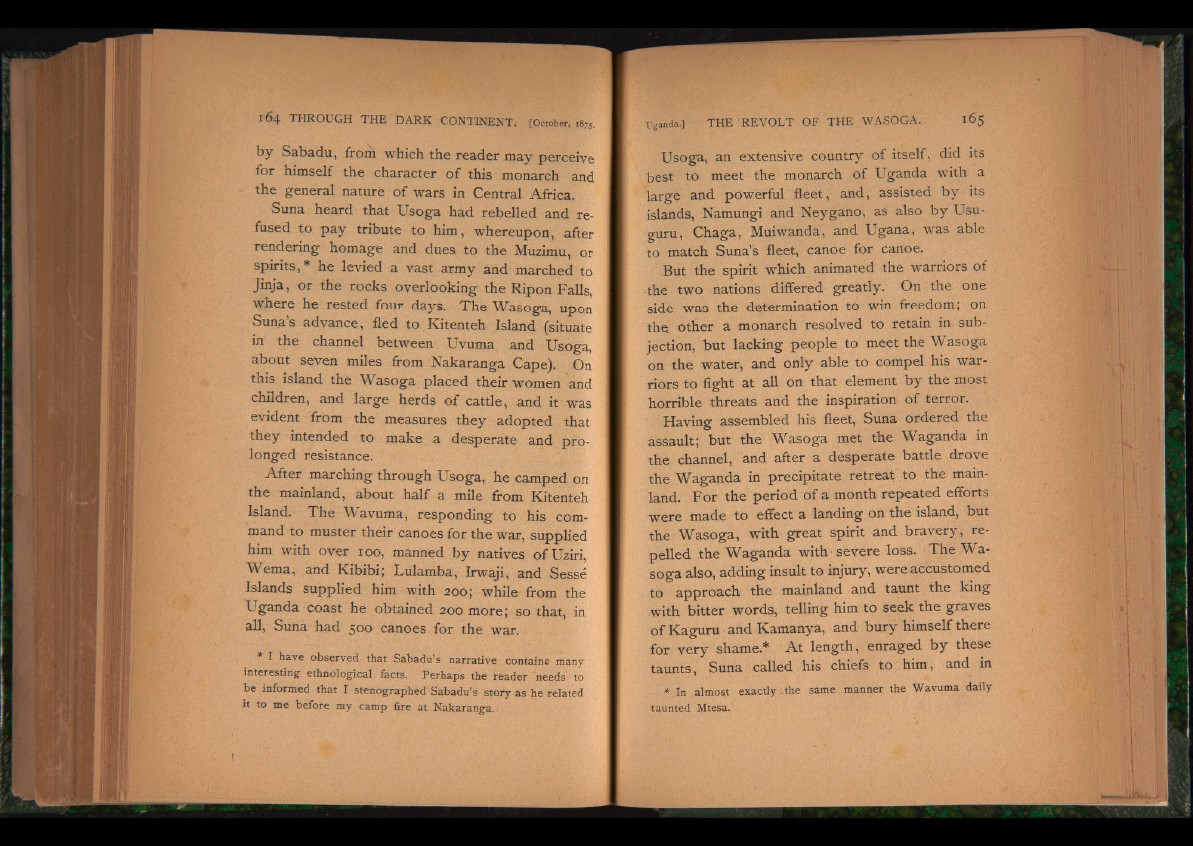
b y Sabadu, from which the reader may perceive
for himself the character o f this monarch and
the general nature o f wars in Central Africa.
Suna heard that Usoga had rebelled and refused
to p a y tribute to him, whereupon, after
rendering homage and dues to the Muzimu, or
spirits,* he levied a vast army and marched to
Jinja, or the rocks overlooking the Ripon Falls
where he rested four days. The Wasoga, upon
Suna’s advance, fled to Kitenteh Island (situate
in the channel between Uvuma and Usoga,
about seven miles from Nakaranga Cape). On
this island the Waso ga placed their women and
children, and large herds o f cattle, and it was
evident from the measures they adopted that
th ey intended to make a desperate and prolonged
resistance.
A fte r marching through Usoga, he camped on
the mainland, about half a mile from Kitenteh
Island. The Wavuma, responding to his command
to muster their canoes for the war, .supplied
him with over 100, manned b y natives o f Uziri,
Wema, and Kibibi; Lulamba, Irwaji, and Sesse
Islands supplied him with 200; while from the
Uganda coast he obtained 200 more; so that, in
all, Suna had 500 canoes for the war.
* I have observed that Sabadu’s narrative contains many
interesting1 ethnological facts. Perhaps the reader needs to
be informed that I stenographed Sabadu’s story as he related
it to me before my camp fire at Nakaranga.
Usoga, an extensive country o f itself, did its
best to meet the monarch o f Uganda with a
large and powerful fleet, and, assisted b y its
islands, Namungi and Neygano, as also b y Usu-
guru, Chaga, Muiwanda, and Ugana, was able
to match Suna’s fleet, canoe for canoe.
But the spirit which animated the warriors of
the two nations differed greatly. On the one
side was the determination to win freedom; on
the other a monarch resolved to retain in subjection,
but lacking people to meet the Waso ga
on the water, and only able to compel his warriors
to fight at all on that element b y the most
horrible threats and the inspiration o f terror.
Having assembled his fleet, Suna ordered the
assault; but the Wasoga met the Waganda in
the channel, and after a desperate battle drove
the Waganda in precipitate retreat to the mainland.
For the period o f a month repeated efforts
were made to effect a landing on the island, but
the W aso g a, with great spirit and bravery, repelled
the Waganda with’ severe loss. The W a so
g a also, adding insult to injury, were accustomed
to approach the mainland and taunt the king
with bitter words, telling him to se ek the graves
o fK a g u ru and Kamanya, and bury himself there
for v e ry shame* A t length, enraged b y these
taunts, Suna called his chiefs to him, and in
* In almost exactly the same manner the Wavuma daily
taunted Mtesa.